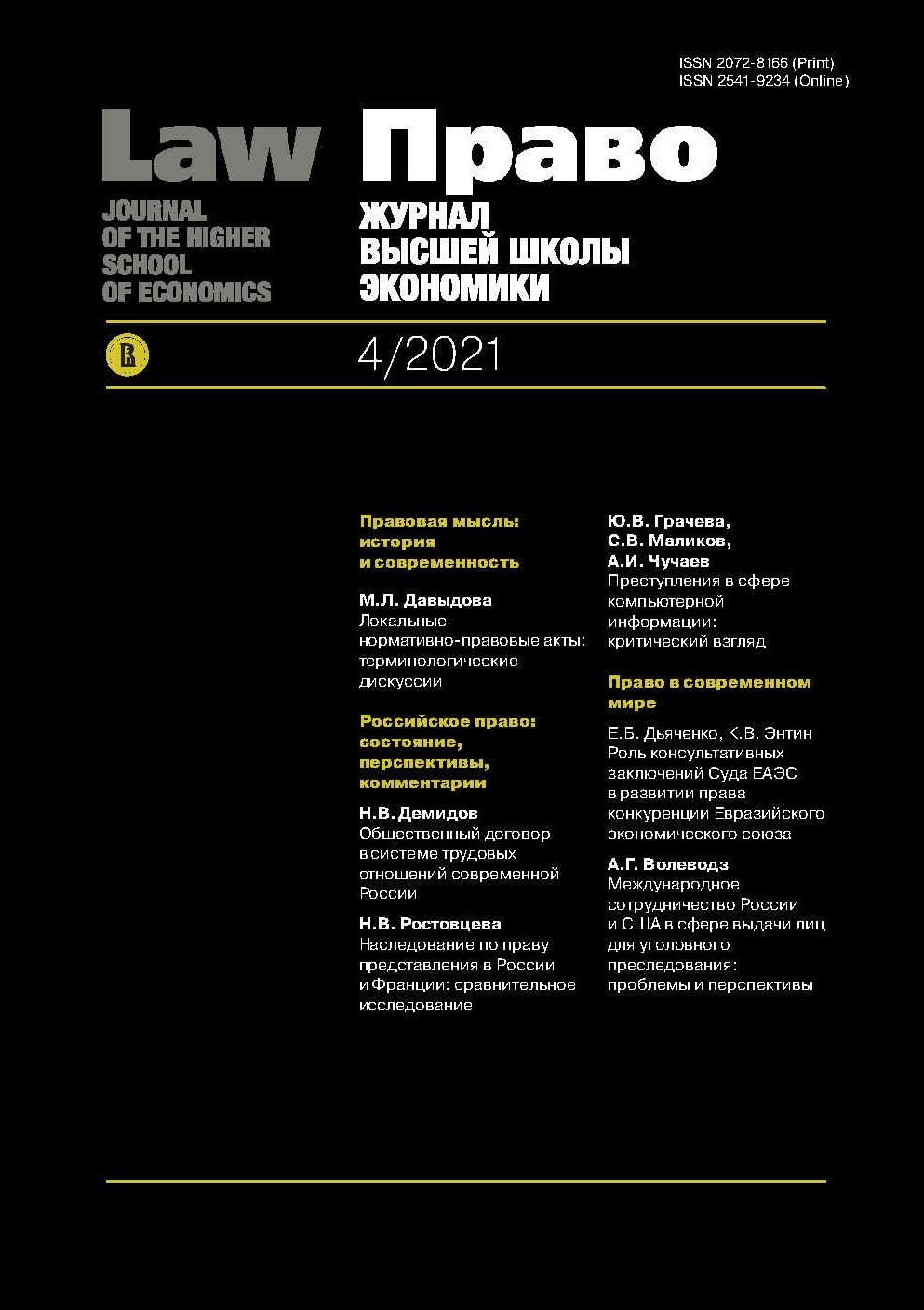Crimes in the Sphere of Computer Information: Critical Look
Abstract
The use of references in legal documents to private technological solutions that implement a particular process has the risks of leaving a wide range of illegal acts in the digital environment unappreciated. Such an approach risks describing only the technologies that exist at a certain moment and the consequences of their illegal use, which, observing the dynamics of modern technological development, does not look prudent. All this requires a revision of terminology of the Criminal Code of the Russian Federation in order to adequately parry existing threats in the field of computer information. A critical analysis of the need to indicate special means of protection and the need for authority in the qualification of actions that infringe on computer information is given. The fact of the presence or absence of special means of protection is not always essential in determining the criminality of an act. It is possible to provide access to information as a result of technological features of the means of information transmission or by mistake. The article analyzes the following methods of committing computer crimes. The paper points out that the malicious impact on information is not always the result of unauthorized access. In particular, the cases of such types of malicious influence on information as: denial of service; transmission of false information; intermediary attack; web injection; physical impact. The greatest criticism of the analyzed crimes is related to the formulation by the legislator of such consequences as the destruction, blocking, modification or copying of information. As a result, the author’s interpretation of the key concepts of signs of the elements of crimes provided for in Chapter 28 of the Criminal Code of the Russian Federation is proposed. As a conclusion, it is stated that information crimes should be classified as computer crimes, regardless of the method of influence. The consequences should be considered from the point of view of the impact on the information system as a whole. When qualifying computer crimes, you should not use as constitutive features that have a narrow technological specificity. The list of consequences can be open, and their enumeration should only be of an orienting nature.
References
Aryamov A.A. et al. (2019) Deviations in the digital world: criminal and legal dimension. Part I. Moscow: Kontrakt, 160 p. (In Russ.).
Borcheva N.A. (2004) Computer crimes in Russia: Commentary to the Russian Criminal Code. Moscow: Prima Press, 22 p. (In Russ.).
Buchanan R. (2019) Cyberspionage and international law. Oxford: Hart, 219 p.
Bykov V.M., Cherkasov V.N. (2012) New law on computer crimes: Art. 272 of the Criminal Code. Rossijskij sud'ya = Russian Judge, no. 5, pp. 14-19. (In Russ.).
Criminal law of Russia (2018) A.I. Rarog (ed.). Moscow: Prospekt, 624 p. (In Russ.).
Efremova M.A. (2012) Liabiibility for illegal access to computer information. Vestnik Kazanskogo yuridicheskogo instituta = Herald of Kazan Jaw Institute, no. 8, pp. 54-56. (In Russ.).
Eun Y.-S., Aßmann J. S. (2016) Cyberwar: Summing up security and war in the digital age. Prospects for International Studies, vol. 17, no. 3, pp. 343-360.
Gladkikh V.I. (2014) Computer fraud: and were there any grounds for criminalizing it? Rossijski sledovatel-Russian Investigator, no. 22, pp. 25-31. (In Russ.).
Gromov E.V. (2006) Development of criminal legislation on crimes in the field of computer information in foreign countries (USA, Great Britain, Germany, the Netherlands, Poland). Vestnik TGPU-Herald of Tyumen Politechnical University, no. 11, pp. 30-35. (In Russ.).
Khaliullin A. I. (2015) Illegal copying as a consequence of a crime in the field of computer information. Rossijskij sledovatel'-Russian Investigator, no. 8, pp. 23-26. (In Russ.).
Khilyuta V.V. (2014) The liability for theft with using computer technology. Zhurnal rossijskogo prava=Journal of Russian Law, no. 3, pp. 111-118. (In Russ.).
Meshkov V.M. (2003) Computer crimes and protection of computer information. Kaliningrad: MVD Institute, 119 p. (In Russ.).
Omarov M.D. (2011) Composition of illegal access for information systems resources. Yuridicheskiy vestnik DGU - Law Herald of Far East University, no. 4, pp. 56-58. (In Russ.).
Panfilova E.I. (2003) The computer crimes. Saint Petersburg: Prosecutor General research institute, 47 p. (In Russ.).
The quality of the criminal law: special part (2017) A.I. Rarog (ed.). Moscow: Prospekt, 381 p. (In Russ.).
Stoddart K. (2016) Cybersecurity of Great Britain and protection of critical national infrastructure. International Affairs, vol. 92, no. 5, pp. 1079-1105.
Tretyak M. I. (2016) Modification of computer information and its correlation with other methods of computer fraud. Ugolovnoe pravo-Criminal Law, no. 2, pp. 95-101. (In Russ.).
Tropina T.L. (2005) Cybercrime: concept, state, legal struggle. Candidate of Juridical Sciences Thesis. Vladivostok, 235 p. (In Russ.).
Yuzhin A.A. (2014) Debatable issues of fraud in the field of computer information. Pravo i kiberbezopasnost'-Law and Cybersecurity, no. 2, pp. 15-18. (In Russ.).
Copyright (c) 2021 Law Journal of the Higher School of Economics

This work is licensed under a Creative Commons Attribution-ShareAlike 4.0 International License.


















